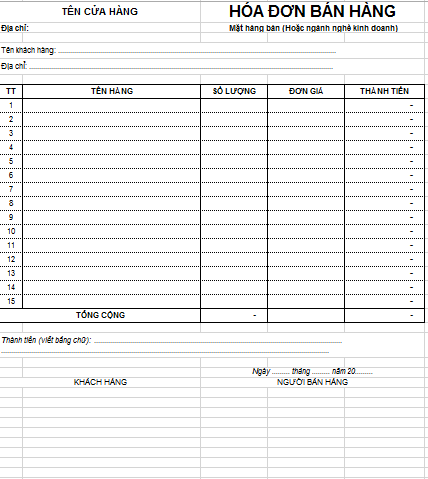What is a sales invoice? What are regulations on the storage of sales invoices in Vietnam?
What is a sales invoice?
Based on Clause 2, Article 8 of Decree 123/2020/ND-CP, the regulations are as follows:
Types of Invoices
Invoices stipulated in this Decree include the following types:
1. Value-added tax invoices are those designated for organizations declaring value-added tax according to the deduction method used for activities such as:
a) Selling goods, providing services domestically;
b) International transportation activities;
c) Export to non-tariff zones and cases deemed as export;
d) Exporting goods, providing services abroad.
2. Sales invoices are invoices designated for organizations and individuals, as follows:
a) Organizations and individuals declaring and calculating value-added tax directly using the following activities:
- Selling goods, providing services domestically;
- International transportation activities;
- Export to non-tariff zones and cases deemed as export;
- Export goods, providing services abroad.
b) Organizations and individuals in non-tariff zones when selling goods, providing services domestically and when selling goods, providing services between organizations and individuals within non-tariff zones, exporting goods, providing services abroad, with the invoice clearly stating "Designated for organizations and individuals in non-tariff zones."
3. Electronic invoices for selling public assets are used when selling the following assets:
a) Public assets at agencies, organizations, units (including state-owned housing);
b) Infrastructure assets;
c) Public assets assigned by the State for enterprises to manage without calculating into the state capital at the enterprise;
d) Assets of projects using state funds;
dd) Assets with established public ownership rights;
e) Public assets recovered as per the decision of competent authorities;
g) Supplies and materials recovered from handling public assets.
4. Electronic invoices for selling national reserve goods are used when agencies, units in the national reserve system sell national reserve goods as per legal regulations.
5. Other types of invoices, including:
a) Stamps, tickets, cards with form and content stipulated in this Decree;
b) Receipts for air freight charges; documents for international transport service charges; banking service fee documents except for cases stipulated in point a of this clause, which have form and content prepared according to international customs and related legal provisions.
6. Vouchers printed, issued, used, and managed like invoices include warehouse dispatch slips cum internal transport, warehouse dispatch slips for consignment sales by agents.
7. The Ministry of Finance provides guidance on displaying invoice samples for the entities mentioned in Article 2 of this Decree for reference during implementation.
Accordingly, referring to the above regulations, a sales invoice is designated for organizations and individuals as follows:
[1] Organizations and individuals declaring and calculating value-added tax directly using the following activities:
- Selling goods, providing services domestically;
- International transportation activities;
- Export to non-tariff zones and cases deemed as export;
- Export goods, providing services abroad.
[2] Organizations and individuals in non-tariff zones when selling goods, providing services domestically and when selling goods, providing services between organizations and individuals within non-tariff zones with each other, exporting goods, providing services abroad, with the invoice clearly stating "Designated for organizations and individuals in non-tariff zones."

What is a sales invoice? What are regulations on the storage of sales invoices in Vietnam? (Image from Internet)
What is the sales invoice template in Vietnam?
Currently, the law has not specifically regulated a sales invoice template, hence readers can refer to the Excel sales invoice template below:

>>> Download The latest sales invoice template 2025.
What are regulations on the storage of sales invoices in Vietnam?
Based on Article 6 of Decree 123/2020/ND-CP which regulates the storage of sales invoices as follows:
- Invoices and vouchers are preserved, retained to ensure:
+ Safety, confidentiality, integrity, completeness, and not being altered or distorted during the retention period;
+ retained correctly and adequately as per accounting law enforcement.
- Electronic invoices, electronic vouchers are preserved, retained via electronic means. Agencies, organizations, individuals have the right to select and apply forms of storage, retention of electronic invoices, electronic vouchers suitable to the nature of their operations and technological capability. Electronic invoices, electronic vouchers must be ready to be printed on paper or accessed upon request.
- Pre-printed invoices by tax agencies, printed vouchers, self-printed must be preserved, retained correctly following the requirements below:
+ Uncreated invoices, vouchers are retained, preserved in a warehouse per voucher storage policies applicable to valuable vouchers.
+ Created invoices, vouchers held in accounting units are retained as per accounting voucher storage regulations.
+ Created invoices, vouchers held by organizations, households, individuals not being accounting units are retained and preserved as personal property of such organizations, households, or individuals.

